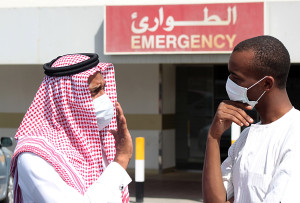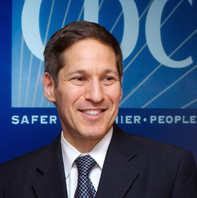Second U.S. MERS Case Reported In Orlando
By Dr. James Palermo // May 13, 2014
SAUDI ARABIAN HEALTHCARE WORKER RECOVERING AT DR. PHILLIPS HOSPITAL
ABOVE VIDEO: NewsyScience reports on the second U.S. MERS case, which was confirmed Monday. The patient is a Florida healthcare worker believed to have treated MERS patients in Saudi Arabia.
The Center for Disease Control and Prevention (CDC) and the Florida Department of Health are investigating the second reported case of Middle East Respiratory Syndrome (MERS) in the United States.

The viral respiratory illness first reported in Saudi Arabia in 2012 is caused by a coronavirus called MERS-CoV.
Confirmed MERS-CoV infection manifests in most people as a severe acute respiratory illness associated with fever, cough, and shortness of breath, and results in death in more than 30% of patients.
TWO CASES SO FAR IN U.S.
On May 2nd, the CDC reported the first U.S. case of MERS in a traveler from Saudi Arabia to the United States, who is now considered fully recovered and has been released from an Indiana hospital.
At an afternoon media briefing on Monday, the CDC confirmed that another traveler from Saudi Arabia was hospitalized at Dr. P. Phillips Hospital in Orlando, for MERS-CoV, and was also recovering and doing well.
BOTH MERS PATIENTS HEALTHCARE WORKERS
The CDC, in collaboration with local public health officials, contacted healthcare workers, family members, and travelers who had close contact with the first patient, and, at this time, there is no evidence of MERS-CoV infection in any of those contacts.

The case under investigation here in Florida involves a healthcare worker from Saudi Arabia, which has been the center of the outbreak.
The affected individual traveled to the U.S. from Jeddah, Saudi Arabia, on May 1, to visit family in Orlando, traveling through London, Boston and Atlanta on the way. The CDC is notifying all the passengers on the U.S. legs of the patient’s journey to check for possible MERS-CoV symptoms, though the risk of transmission is considered very slight.
Both U.S. cases involved healthcare workers, but there is no evidence that the two cases are related in any way.
ALL CASES LINKED TO ARABIAN PENINSULA
MERS-CoV, a virus relatively new to humans, was first reported in Saudi Arabia in 2012, and to date, all the cases have been linked to countries in the Arabian Peninsula.

The recent surge in MERS included more than twice the number of cases previously reported to the World Health Organization (WHO).
In WHO’s most recent summary of the effects of the disease, the agency said it has been officially informed of 536 cases and 145 deaths since April 2012.
U.S. CASES REPRESENT LOW RISK TO GENERAL PUBLIC
Dr. Tom Frieden, director of the CDC, said the disease has primarily been transmitted by close personal contact, such as caring for or living with an infected person and not through casual contact.

However, there is no evidence of sustained spreading in community settings, and these two U.S. cases of MERS represent a very low risk to the general public in this country.
No vaccine exists for the virus, which is part of the coronavirus family that includes the common cold.
Treatment consists of standard supportive care for a respiratory illness, and preventive methods include meticulous hand washing, wiping down potentially infected surfaces with anti-bacterial agents and avoiding others who are sick.
CDC FOCUSED ON STOPPING MERS SPREAD
Along with other public health partners, the CDC is focused on investigating and responding to the changing situation to prevent the spread of MERS-CoV in the U.S.
The CDC also continues to closely monitor the MERS situation globally and work with international partners to better understand the risks of this virus, including the source, how it spreads, and how infections might be prevented.
QUESTIONS AND ANSWERS ABOUT MERS
For information about the virus, how it spreads, symptoms, prevention tips, and what CDC is doing, see Frequently Asked Questions & Answers.











